11 Iconic Moments in World Championships History; Michael Phelps’ Seven Golds in Melbourne Dazzled
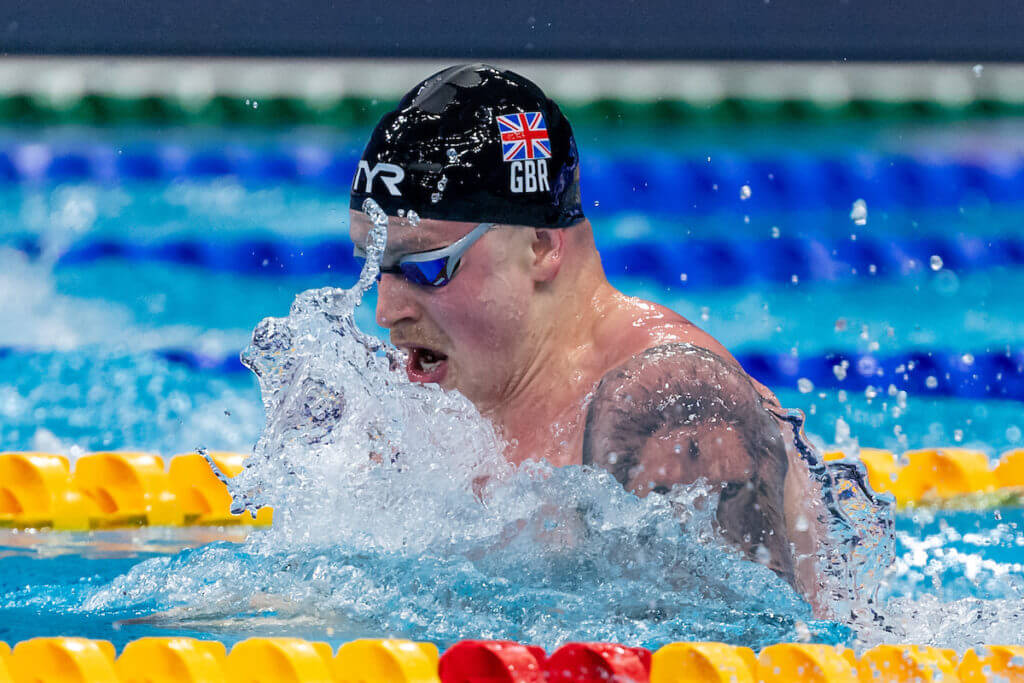
11 Iconic Moments in World Championships History; Michael Phelps’ Seven Golds in Melbourne Dazzled
Since FINA introduced the World Championships in 1973, hundreds of athletes have been crowned as global titlists. Beyond capturing Olympic gold or setting a world record, earning a world championship is the highest honor attainable for an athlete in the sport. And in nearly a half-century of World Champs, there is no shortage of premium performances.
As the next edition of Worlds is set to open in Budapest this month, Swimming World has compiled a list of some of the finest swims or most-significant storylines in the history of the competition. The selections are listed chronologically, and while some deserving options are not included, these 11 certainly earned recognition.
1973 (Belgrade)
Rick DeMont (400 Freestyle)
No, it didn’t carry the same prestige, and it couldn’t erase the pain of the prior year. Yet, what American Rick DeMont managed at the 1973 World Championships in Yugoslavia served as a measure of redemption for a teenager robbed of Olympic glory and let down by senior officials who should have protected the youth’s best interests.
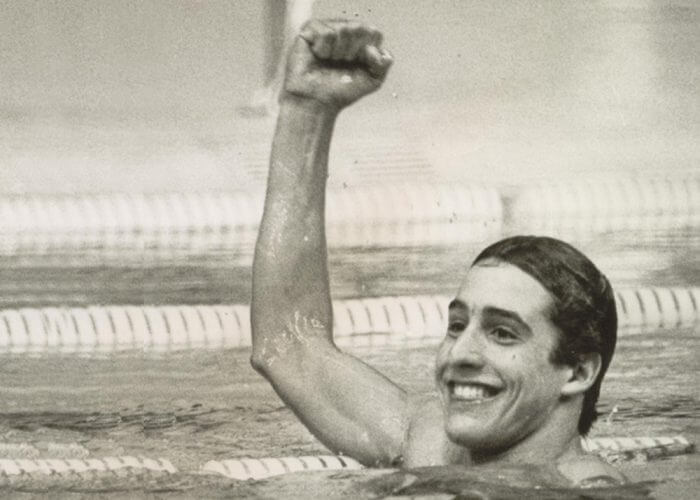 At the 1972 Olympic Games in Munich, DeMont initially appeared to win gold in the 400 meter freestyle. Within days, though, DeMont was disqualified, his Olympic title handed to runner-up Brad Cooper of Australia. The DQ was the result of a positive test for trace amounts of ephedrine, which was found in DeMont’s asthma medication. United States authorities were supposed to list the substance on DeMont’s medical forms, which would have allowed for its use. However, officials failed to file the paperwork, and DeMont was the victim of negligence.
At the 1972 Olympic Games in Munich, DeMont initially appeared to win gold in the 400 meter freestyle. Within days, though, DeMont was disqualified, his Olympic title handed to runner-up Brad Cooper of Australia. The DQ was the result of a positive test for trace amounts of ephedrine, which was found in DeMont’s asthma medication. United States authorities were supposed to list the substance on DeMont’s medical forms, which would have allowed for its use. However, officials failed to file the paperwork, and DeMont was the victim of negligence.
When the World Champs debuted in 1973, DeMont again won the 400 freestyle—and this time was allowed to keep his crown. Behind a performance of 3:58.18, the future standout coach established a world record and became the first man to crack the four-minute barrier. More, he earned a degree of redemption for the travesty he endured on the Olympic stage.
1978 (West Berlin)
Tracy Caulkins (Multi-Events)
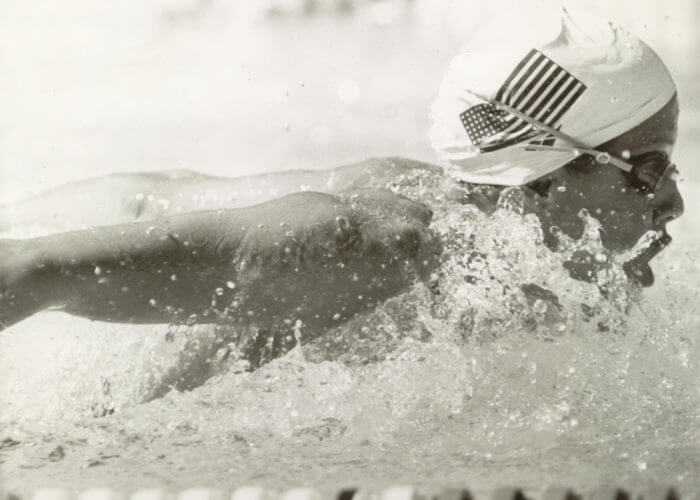
Tracy Caulkins
An argument can be made that Tracy Caulkins is the finest all-around performer in the history of the sport, an athlete who set American records over all four strokes, along with the individual medley. And what Caulkins did at the 1978 World Champs only confirmed her status as a multi-event star.
In the third edition of the meet, Caulkins made six visits to the podium, including four trips for her individual performances. In addition to setting world records in the 200 butterfly, 200 individual medley and 400 IM, Caulkins was the silver medalist in the 100 breaststroke, her time under the previous global standard.
Caulkins also helped a pair of American relays to titles, and her performances were supposed to be precursors to greatness at the 1980 Olympic Games in Moscow. However, Caulkins was one of the hundreds of American athletes caught in a political maelstrom as United States President Jimmy Carter called for a boycott of the Games.
1982 (Guayaquil)
Petra Schneider (400 Individual Medley)
One of the worst-kept secrets in the sport from the early 1970s through the late 1980s was the systematic-doping program that carried East Germany to female dominance. One of the most-emblematic exhibits of that steroid-fueled machine was the effort of Petra Schneider in the 400 medley at the 1982 edition of Worlds in Ecuador.
En route to a time of 4:36.10, Schneider shredded the opposition in the decathlon of the sport. Aside from bettering countrywoman Kathleen Nord by more than seven seconds, Schneider finished more than eight seconds ahead of Tracy Caulkins, the reigning world champ. Although Caulkins was not in peak form, the thumping endured by the American suggested something was amiss—even if officials refused to acknowledge the injustice.
Schneider’s record from 1982 was so powerful, it endured for 15 years, not wiped from the record book until China’s Chen Yan clocked 4:34.79 in 1997. Even today, 40 years after she registered the outing, Schneider’s mark remains an impressive swim in the event.
1986 (Madrid)
Kristin Otto (Multi-Events)
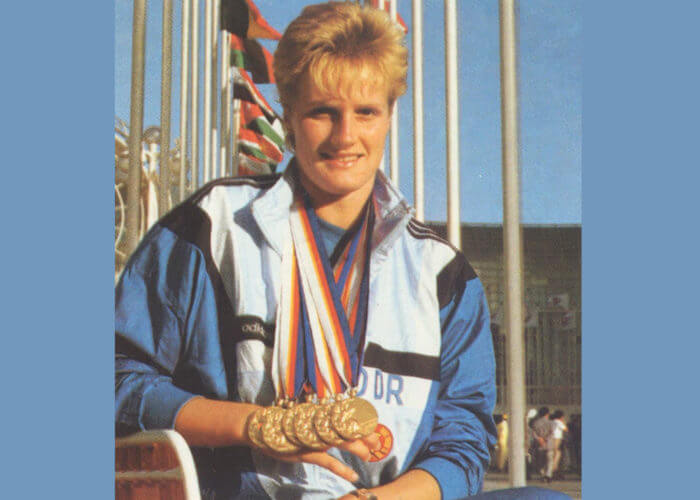
Kristin Otto
At the 1988 Olympic Games in Seoul, Kristin Otto collected six gold medals, headlined by titles in the 50 freestyle, 100 freestyle, 100 backstroke and 100 butterfly. That Olympic excellence was not surprising based on Otto’s prior dominance, including her efforts at the 1986 World Champs.
While Matt Biondi was the showstopper in the men’s competition, Otto walked away with six medals in women’s action. The East German won the 50 freestyle and 200 individual medley, was on a pair of triumphant relays, and secured silver in the 100 butterfly and 50 freestyle.
Despite never testing positive for performance-enhancing drugs, Otto’s name appeared in documents—released after the fall of the Berlin Wall—that indicated the use of steroids. Otto, like many East German athletes, is remembered equally for her multi-medal hauls as much as for the doubt surrounding those achievements.
1994 (Rome)
Chinese Doping
The presence of doping has been a primary theme during several editions of the World Championships, including the 1994 version. Although China was strong at the 1992 Olympics in Barcelona, its women were phenomenal at the 1994 Worlds in Italy, where they earned gold medals in 12 of the 16 events contested. More, China had three gold-silver finishes.
Eyes rolled on the pool deck, with some coaches—irate over what transpired—unwilling to bite their tongues any longer. They knew what PEDs meant to East Germany, and a repeat was not going to be accepted.
“I believe you have to be incredibly naive to ignore the circumstantial evidence,” said Dennis Pursley, the United States’ national team director. “The current situation is an exact replica of (East Germany), and it is depriving deserving athletes of the attention and success they deserve.
“We can’t put our heads in the sand again and pretend what we know is happening isn’t happening. Our athletes just aren’t buying it this time. Common sense tells you that our athletes aren’t going to make the major sacrifices required to compete at this level when they know the deck is stacked against them.”
1998 (Perth)
Ian Thorpe (400 Freestyle)
Performances in the years ahead were more iconic and difficult to fathom, but there is something special about that breakout moment in an athlete’s career. And for Australian Ian Thorpe, his introduction to the world came at the 1998 Worlds in western Australia.
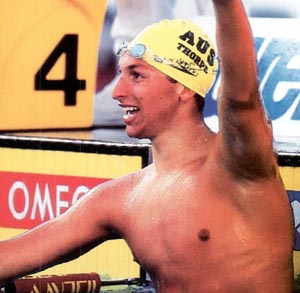 A 15-year-old prodigy, Thorpe unleashed a spectacular come-from-behind performance to claim the gold medal in the 400 freestyle. Thorpe ran down countryman and would-be longtime rival Grant Hackett to prevail in 3:46.29, Hackett a touch behind in 3:46.44. In less than four minutes, Thorpe set the stage for what would come.
A 15-year-old prodigy, Thorpe unleashed a spectacular come-from-behind performance to claim the gold medal in the 400 freestyle. Thorpe ran down countryman and would-be longtime rival Grant Hackett to prevail in 3:46.29, Hackett a touch behind in 3:46.44. In less than four minutes, Thorpe set the stage for what would come.
Throughout his career, Thorpe was awe-inspiring, establishing himself as an Olympic champion in the 200 freestyle and 400 freestyle, and serving as a major cog in Australian relay success. And it all started at the World Championships, a competition on home soil that provided the opportunity for The Thorpedo to reveal his power.
2003 (Barcelona)
Ian Crocker (100 Butterfly)
Ian Crocker, with Michael Phelps in the background
A few years earlier, Ian Crocker qualified to represent the United States at the 2000 Olympic Games in Sydney. As a teenager, Crocker just missed an individual medal, finishing fourth in the 100 butterfly. By the time the 2003 World Champs in Spain rolled around, Crocker was a Team USA staple, having won silver in his prime event at the 2001 Worlds in Fukuoka, Japan.
But Crocker took a major leap forward in Barcelona, to the surprise of everyone—including himself. In the final of the 100 fly, the American held off a hard-charging Michael Phelps by 12-hundredths and won in 50.98 to become the first man in history to break the 51-second barrier.
How big of a jump was the swim for Crocker? Well, it was also the first time he had cracked the 52-second barrier, and the swim elicited a shocked reaction from the University of Texas star.
2005 (Montreal)
Otylia Jedrzejczak (200 Butterfly)
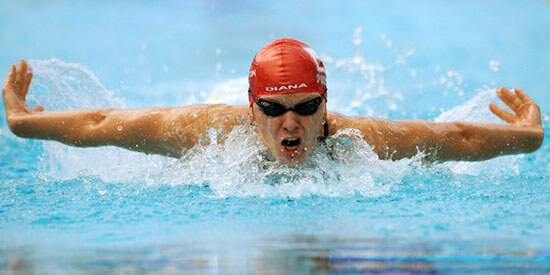
Photo Courtesy: Otylia Jedrzejczak
The biggest storyline of the 2005 World Championships was Australian Grant Hackett and his sweep of the 400, 800 and 1500 freestyle events. But controversy could not be ignored in the women’s competition as Poland’s Otylia Jedrzejczak and Australian Jessicah Schipper dueled in the 200 butterfly.
At the finish of the event, it seemed both women deserved a tip of the cap, as they each went under the previous world record. Jedrzejczak won in 2:05.61, slightly quicker than the 2:05.65 of Schipper. Yet, when replays of the finish were shown, it was obvious that officials missed a violation by Jedrzejczak, as she touched the wall with one hand, as opposed to the required two-hand touch in butterfly.
The Australian media called for a disqualification of the Polish swimmer, but with no replay allowed in an official capacity, the result was not reversed, and the event is viewed historically with an asterisk.
2007 (Melbourne)
Michael Phelps (Multi-Events)
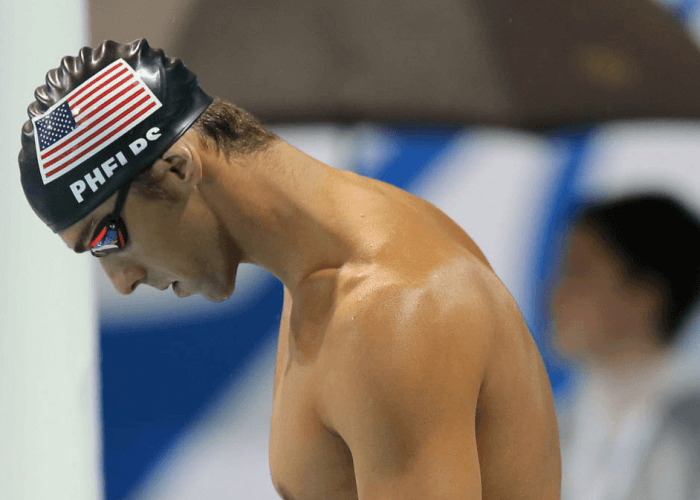
Michael Phelps – Photo Courtesy: Paul Younan
The eight gold medals won by Michael Phelps at the 2008 Olympics is widely considered (rightfully so) the greatest meet in the sport’s history. A year earlier, however, Phelps was equally impressive at the World Championships in Australia. Inside Rod Laver Arena, Phelps won seven gold medals (five individual), and an eighth would have been likely if not for an American disqualification in the prelims of the 400 medley relay.
Phelps set four solo world records that week, including the takedown of Ian Thorpe’s global mark in the 200 freestyle. More, he didn’t just defeat the opposition. He pummeled his foes, leaving no doubt that Phelps was basically racing in another pool. It was the perfect setup to the next summer and what Phelps pulled off in Beijing.
Of course, the 2008 Games featured Phelps breaking Mark Spitz’s record of seven gold medals in a single Games and included his epic rundown of Serbian Milorad Cavic in the 100 butterfly.
2009 (Rome)
The Suit Charade
Simply put, the 2009 edition of the World Championships was a joke. Held at the height of the controversial inclusion of polyurethane suits, 43 world records were set during the competition, which was more about technology than pure skill. Athletes benefited considerably from the enhanced buoyancy provided by the suits, and finishing power never previously seen.
World records are supposed to be appreciated, as they are the culmination of hard work and talent coming together. In Rome, the world records were basically expected during each final, the suits having closed the gap between good swimmers and the great ones. Meanwhile, some of the times posted remain in the record book.
If there was a positive, it was the pressure placed on FINA to return swimming to a skill-based sport, and not a circus based on what someone was wearing.
2019 (Gwangju)
Adam Peaty (100 Breaststroke)
In between capturing Olympic titles in the 100 breaststroke at the 2016 Olympics and the 2020 Games, Great Britain’s Adam Peaty reached a point that was once deemed impossible.
In the semifinals of the 100 breaststroke at the 2019 World Champs in South Korea, Peaty clocked in at 56.88 to become the first man under the 57-second threshold. At the time of the performance, Peaty was also the only individual ever to crack 58 seconds, proof that he had taken the event to a special realm.
Working with Coach Mel Marshall, Peaty had identified his goal of going sub-57 as “Project 56,” a catchy name for a target that no one else could dream of hitting. While Peaty was 57-low in the final of the event, he chased down a longtime goal and proved that no belief is unattainable.




You forgot Darny’s 200 IM win in Perth in 1991, first man to break 2 minuts.